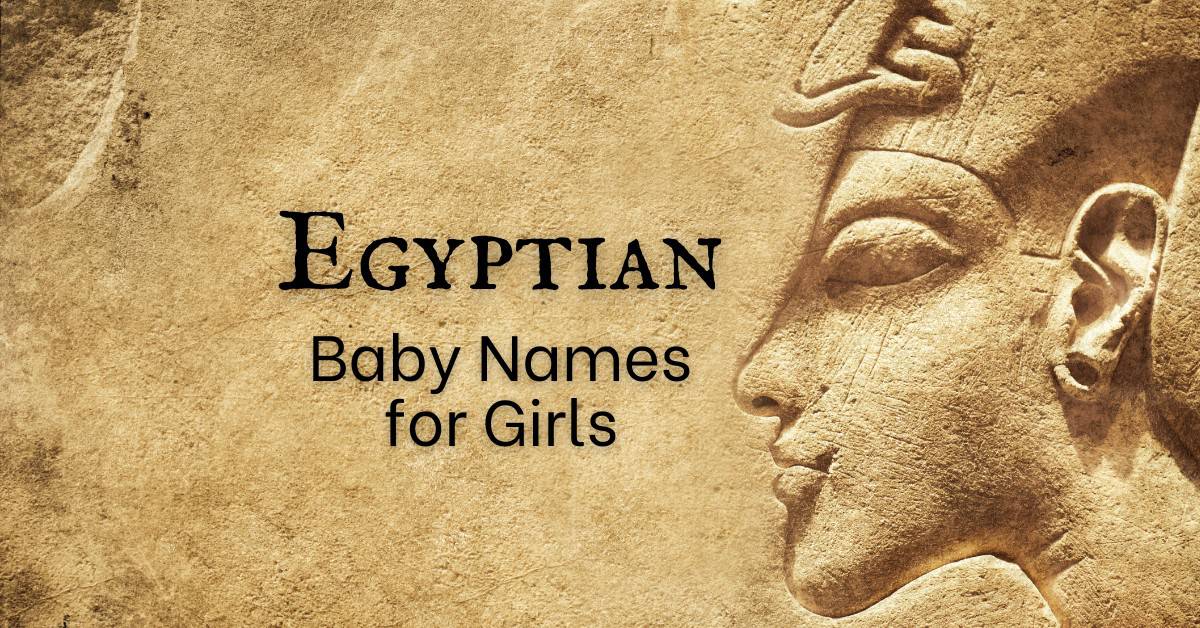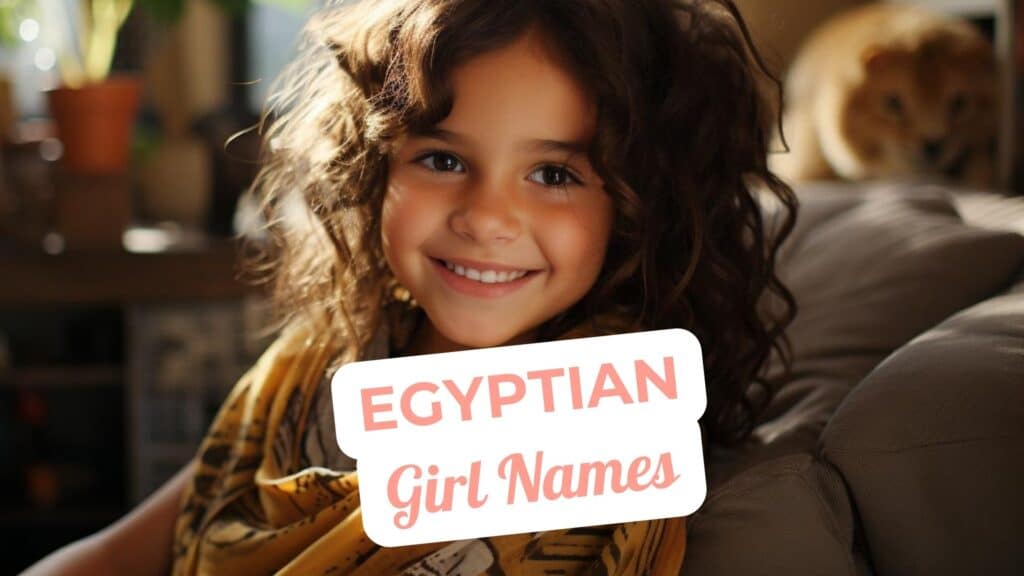Egyptian female names have long captivated people with their beauty and rich cultural history.
Many parents today are drawn to these names but struggle to find a wide selection that fits their preferences. I’m here to help solve that problem.
In this blog post, I’ll share over stunning Egyptian female names, each with unique charm and meaning.
You’ll find options ranging from popular classics to rare gems, perfect for finding the ideal name for your little girl. I’ll provide each name’s pronunciation, meaning, and cultural significance, making your choice easier.
If you’re expecting a baby, writing a story, or simply curious about Egyptian names, this comprehensive list has something for everyone.
List of Egyptian Female Names for Your Baby

1. Aaliyah
- Meaning: Exalted, sublime
- Origin: Arabic
- Cultural Significance: A popular name in Arabic-speaking countries, often associated with high status and nobility.
2. Amina
- Meaning: Trustworthy, faithful
- Origin: Arabic
- Cultural Significance: A name with historical significance, as it was the name of the Prophet Muhammad’s mother.
3. Amira
- Meaning: Princess, leader
- Origin: Arabic
- Cultural Significance: Often used to denote royalty or leadership in Arabic-speaking cultures.
4. Anippe
- Meaning: Daughter of the Nile
- Origin: Egyptian
- Cultural Significance: Reflects a deep connection to the Nile River, central to Egyptian life and culture.
5. Ankhesenamun
- Meaning: Her life is of Amun
- Origin: Egyptian
- Cultural Significance: A queen of ancient Egypt, known for her marriage to Tutankhamun.
6. Asenath
- Meaning: She belongs to the goddess Neith
- Origin: Egyptian
- Cultural Significance: A biblical figure, wife of Joseph, representing a link between Egyptian and Hebrew traditions.
7. Asimah
- Meaning: Protector, guardian
- Origin: Arabic
- Cultural Significance: Signifies protection and guardianship, valued traits in many cultures.
8. Aziza
- Meaning: Precious, powerful
- Origin: Arabic
- Cultural Significance: Commonly used in both Arabic and African cultures to convey importance and value.
9. Bahiti
- Meaning: Fortune, luck
- Origin: Egyptian
- Cultural Significance: Often used to express a wish for good luck and prosperity.
10. Bastet
- Meaning: Devouring lady
- Origin: Egyptian
- Cultural Significance: An ancient Egyptian goddess of home, fertility, and cats, symbolizing protection and blessings.
11. Cleopatra
- Meaning: Glory of the father
- Origin: Greek
- Cultural Significance: One of the most famous queens of Egypt, symbolizing power, beauty, and intelligence.
12. Dalila
- Meaning: Delicate, gentle
- Origin: Arabic
- Cultural Significance: Emphasizes traits of gentleness and kindness, popular in many cultures.
13. Dendera
- Meaning: From Dendera
- Origin: Egyptian
- Cultural Significance: Named after the ancient city of Dendera, known for its temple complex.
14. Ebonee
- Meaning: Black, dark beauty
- Origin: English
- Cultural Significance: Celebrates dark beauty and strength, often used in African-American communities.
15. Edrice
- Meaning: Prosperous ruler
- Origin: Arabic
- Cultural Significance: Implies leadership and prosperity, common in many Arabic-speaking countries.
16. Eset
- Meaning: Throne
- Origin: Egyptian
- Cultural Significance: Another name for Isis, the Egyptian goddess of health, marriage, and wisdom.
17. Fadila
- Meaning: Virtuous, excellent
- Origin: Arabic
- Cultural Significance: Represents virtue and excellence, valued traits in many cultures.
18. Fajr
- Meaning: Dawn
- Origin: Arabic
- Cultural Significance: Symbolizes new beginnings and hope, important in Islamic tradition.
19. Farida
- Meaning: Unique, precious
- Origin: Arabic
- Cultural Significance: Signifies uniqueness and value, often used to express how special someone is.
20. Fayruz
- Meaning: Turquoise
- Origin: Arabic
- Cultural Significance: Named after the precious stone, symbolizing beauty and rarity.
21. Gamila
- Meaning: Beautiful
- Origin: Arabic
- Cultural Significance: Commonly used to describe physical and inner beauty.
22. Hagar
- Meaning: Flight, forsaken
- Origin: Hebrew
- Cultural Significance: A biblical figure, mother of Ishmael, representing strength and endurance.
23. Hana
- Meaning: Happiness, flower
- Origin: Arabic, Japanese
- Cultural Significance: Signifies happiness in Arabic and flower in Japanese, a popular name across cultures.
24. Hasina
- Meaning: Good, beautiful
- Origin: Arabic
- Cultural Significance: Used to describe someone with good character and beauty.
25. Hatshepsut
- Meaning: Foremost of noble ladies
- Origin: Egyptian
- Cultural Significance: One of the most successful female pharaohs of ancient Egypt, symbolizing power and leadership.
26. Hawa
- Meaning: Desire, air
- Origin: Arabic
- Cultural Significance: Often associated with Eve, the first woman in Islamic tradition, representing the origin of humanity.
27. Heba
- Meaning: Gift, donation
- Origin: Arabic
- Cultural Significance: Symbolizes a gift or blessing, often used to express gratitude.
28. Huda
- Meaning: Guidance
- Origin: Arabic
- Cultural Significance: Emphasizes the importance of guidance and direction in life, valued in Islamic culture.
29. Iman
- Meaning: Faith, belief
- Origin: Arabic
- Cultural Significance: A strong name representing faith, important in Islamic tradition.
30. Ines
- Meaning: Pure, holy
- Origin: Greek, Spanish
- Cultural Significance: Common in many cultures, symbolizing purity and holiness.
31. Isis
- Meaning: Throne
- Origin: Egyptian
- Cultural Significance: An ancient Egyptian goddess of health, marriage, and wisdom, revered in many traditions.
32. Jamila
- Meaning: Beautiful
- Origin: Arabic
- Cultural Significance: Widely used to describe physical and inner beauty.
33. Jomana
- Meaning: Silver pearl
- Origin: Arabic
- Cultural Significance: Symbolizes preciousness and rarity.
34. Kamaria
- Meaning: Like the moon
- Origin: Swahili
- Cultural Significance: Often used to describe someone with a serene and beautiful presence.
35. Karima
- Meaning: Generous, noble
- Origin: Arabic
- Cultural Significance: Emphasizes generosity and nobility, important traits in many cultures.
36. Keket
- Meaning: Goddess of darkness
- Origin: Egyptian
- Cultural Significance: Represents the night and darkness, a significant figure in ancient Egyptian mythology.
37. Khepri
- Meaning: Emerging from the earth
- Origin: Egyptian
- Cultural Significance: Associated with the scarab beetle, symbolizing creation and rebirth.
38. Khonsu
- Meaning: Traveler, god of the moon
- Origin: Egyptian
- Cultural Significance: An ancient Egyptian god of the moon, representing travel and time.
39. Layla
- Meaning: Night
- Origin: Arabic
- Cultural Significance: Often used to describe the beauty of the night.
40. Lila
- Meaning: Night, dark beauty
- Origin: Arabic, Sanskrit
- Cultural Significance: Symbolizes the beauty and mystery of the night, popular in many cultures.
41. Malak
- Meaning: Angel
- Origin: Arabic
- Cultural Significance: Often used to describe someone with an angelic nature.
42. Mariam
- Meaning: Bitter, beloved
- Origin: Arabic, Hebrew
- Cultural Significance: A name with religious significance, as it is the Arabic form of Mary, mother of Jesus.
43. Marwa
- Meaning: Flint stone
- Origin: Arabic
- Cultural Significance: One of the sacred places in Mecca, important in Islamic tradition.
44. Maat
- Meaning: Truth, balance
- Origin: Egyptian
- Cultural Significance: An ancient Egyptian goddess of truth, justice, and cosmic order.
45. Mayet
- Meaning: Goddess of the earth
- Origin: Egyptian
- Cultural Significance: Represents the earth and fertility, an important figure in ancient Egyptian religion.
46. Meret
- Meaning: Beloved
- Origin: Egyptian
- Cultural Significance: A name often associated with love and affection.
47. Merneith
- Meaning: Beloved of Neith
- Origin: Egyptian
- Cultural Significance: An early Egyptian queen, reflecting divine favor and royalty.
48. Merit
- Meaning: Beloved
- Origin: Egyptian
- Cultural Significance: Commonly used to express love and endearment.
49. Meskhenet
- Meaning: Goddess of childbirth
- Origin: Egyptian
- Cultural Significance: An ancient Egyptian goddess who presided over childbirth and destiny.
50. Neith
- Meaning: Divine mother
- Origin: Egyptian
- Cultural Significance: An ancient Egyptian goddess of war and weaving, symbolizing motherhood and creativity.
51. Nefertari
- Meaning: Beautiful companion
- Origin: Egyptian
- Cultural Significance: A queen of ancient Egypt, known for her beauty and intelligence.
52. Nefertiti
- Meaning: The beautiful one has come
- Origin: Egyptian
- Cultural Significance: One of the most famous queens of Egypt, celebrated for her beauty and power.
53. Nephthys
- Meaning: Lady of the house
- Origin: Egyptian
- Cultural Significance: An ancient Egyptian goddess associated with mourning and protection.
54. Noura
- Meaning: Light
- Origin: Arabic
- Cultural Significance: Signifies brightness and illumination, often used to describe someone who brings light into others’ lives.
55. Nut
- Meaning: Sky, heavens
- Origin: Egyptian
- Cultural Significance: An ancient Egyptian goddess of the sky, representing the heavens and cosmic order.
56. Omaima
- Meaning: Little mother
- Origin: Arabic
- Cultural Significance: Often used to express affection and endearment.
57. Omneya
- Meaning: Wish, desire
- Origin: Arabic
- Cultural Significance: Symbolizes hope and aspiration, common in many Arabic-speaking cultures.
58. Qadira
- Meaning: Powerful
- Origin: Arabic
- Cultural Significance: Emphasizes strength and capability, valued traits in many cultures.
59. Qistina
- Meaning: Just, fair
- Origin: Arabic
- Cultural Significance: Represents fairness and justice, important in many societies.
60. Rabiah
- Meaning: Spring
- Origin: Arabic
- Cultural Significance: Often associated with renewal and growth, reflecting the qualities of springtime.
61. Rania
- Meaning: Queen
- Origin: Arabic
- Cultural Significance: Used to denote royalty and leadership.
62. Rashida
- Meaning: Righteous, wise
- Origin: Arabic
- Cultural Significance: Emphasizes wisdom and righteousness, valued traits in many cultures.
63. Rawan
- Meaning: Watered
- Origin: Arabic
- Cultural Significance: Symbolizes refreshment and vitality, important in many desert cultures.
64. Reem
- Meaning: Gazelle
- Origin: Arabic
- Cultural Significance: Represents grace and beauty, often used to describe someone delicate and elegant.
65. Rasha
- Meaning: Young gazelle
- Origin: Arabic
- Cultural Significance: Emphasizes youth and grace, common in Arabic-speaking cultures.
66. Sabra
- Meaning: Patient
- Origin: Arabic
- Cultural Significance: Signifies patience and endurance, valued traits in many cultures.
67. Safiya
- Meaning: Pure, clear
- Origin: Arabic
- Cultural Significance: Often used to describe someone with a pure and clear heart.
68. Saira
- Meaning: Traveler
- Origin: Arabic
- Cultural Significance: Represents exploration and adventure, common in many cultures.
69. Salma
- Meaning: Safe, peaceful
- Origin: Arabic
- Cultural Significance: Emphasizes safety and peace, valued traits in many societies.
70. Samira
- Meaning: Entertaining companion
- Origin: Arabic
- Cultural Significance: Often used to describe someone who brings joy and entertainment to others.
71. Sanura
- Meaning: Kitten
- Origin: Swahili
- Cultural Significance: Symbolizes innocence and playfulness, popular in many cultures.
72. Selene
- Meaning: Moon
- Origin: Greek
- Cultural Significance: An ancient Greek goddess of the moon, symbolizing beauty and tranquility.
73. Semira
- Meaning: Companion in conversation
- Origin: Arabic
- Cultural Significance: Emphasizes the importance of companionship and communication.
74. Senet
- Meaning: The game of passing
- Origin: Egyptian
- Cultural Significance: An ancient Egyptian board game, symbolizing life’s journey and challenges.
75. Seshat
- Meaning: Scribe
- Origin: Egyptian
- Cultural Significance: An ancient Egyptian goddess of writing and knowledge, representing wisdom and learning.
76. Shadia
- Meaning: Singer
- Origin: Arabic
- Cultural Significance: Often used to describe someone with a beautiful singing voice.
77. Shani
- Meaning: Marvelous
- Origin: Hebrew, Swahili
- Cultural Significance: Used to describe someone wonderful and extraordinary.
78. Siti
- Meaning: Lady
- Origin: Swahili
- Cultural Significance: Used to denote respect and nobility.
79. Tahira
- Meaning: Pure, chaste
- Origin: Arabic
- Cultural Significance: Emphasizes purity and chastity, valued traits in many cultures.
80. Takisha
- Meaning: Alive and well
- Origin: Swahili
- Cultural Significance: Represents vitality and well-being.
81. Taliba
- Meaning: Seeker of knowledge
- Origin: Arabic
- Cultural Significance: Emphasizes the importance of learning and education.
82. Tamara
- Meaning: Date palm
- Origin: Hebrew
- Cultural Significance: Symbolizes fertility and abundance, common in many cultures.
83. Tameri
- Meaning: Beloved land
- Origin: Egyptian
- Cultural Significance: Reflects love for one’s country, often used in ancient Egyptian names.
84. Tauret
- Meaning: Great one
- Origin: Egyptian
- Cultural Significance: An ancient Egyptian goddess of fertility and childbirth.
85. Thalia
- Meaning: To blossom
- Origin: Greek
- Cultural Significance: One of the Greek Muses, symbolizing festivity and abundance.
86. Thutmose
- Meaning: Born of Thoth
- Origin: Egyptian
- Cultural Significance: An ancient Egyptian pharaoh, emphasizing the connection to the god Thoth.
87. Tiye
- Meaning: Strong
- Origin: Egyptian
- Cultural Significance: An ancient Egyptian queen, known for her strength and influence.
88. Tia
- Meaning: Aunt
- Origin: Greek, Spanish
- Cultural Significance: Often used to denote familial affection and closeness.
89. Tutankhamun
- Meaning: Living image of Amun
- Origin: Egyptian
- Cultural Significance: One of the most famous pharaohs, symbolizing the divine connection to Amun.
90. Uba
- Meaning: Wealthy
- Origin: Arabic
- Cultural Significance: Represents prosperity and abundance.
91. Uchenna
- Meaning: God’s will
- Origin: Igbo
- Cultural Significance: Emphasizes faith and divine guidance, common in many African cultures.
92. Udjat
- Meaning: Whole, healthy
- Origin: Egyptian
- Cultural Significance: The eye of Horus, symbolizing protection and good health.
93. Umi
- Meaning: Mother
- Origin: Arabic, Japanese
- Cultural Significance: Often used to express maternal love and care.
94. Walaa
- Meaning: Loyalty
- Origin: Arabic
- Cultural Significance: Emphasizes loyalty and faithfulness, valued traits in many cultures.
95. Wasimah
- Meaning: Graceful, beautiful
- Origin: Arabic
- Cultural Significance: Often used to describe someone with grace and beauty.
96. Yasmine
- Meaning: Jasmine flower
- Origin: Persian
- Cultural Significance: Symbolizes beauty and elegance, popular in many cultures.
97. Yasmin
- Meaning: Jasmine flower
- Origin: Persian
- Cultural Significance: Similar to Yasmine, emphasizing beauty and grace.
98. Zahra
- Meaning: Flower, shining
- Origin: Arabic
- Cultural Significance: Often used to describe someone radiant and beautiful.
99. Zainab
- Meaning: Fragrant flower
- Origin: Arabic
- Cultural Significance: A common name in Arabic-speaking countries, associated with beauty and grace.
100. Zaina
- Meaning: Beautiful
- Origin: Arabic
- Cultural Significance: Emphasizes beauty and attractiveness.
101. Zakia
- Meaning: Pure
- Origin: Arabic
- Cultural Significance: Represents purity and innocence, valued traits in many cultures.
102. Zalika
- Meaning: Well-born
- Origin: Swahili
- Cultural Significance: Emphasizes noble birth and high status.
103. Zamzam
- Meaning: Sacred water
- Origin: Arabic
- Cultural Significance: Named after the holy well in Mecca, significant in Islamic tradition.
104. Zeina
- Meaning: Ornament, decoration
- Origin: Arabic
- Cultural Significance: Often used to describe someone who adorns and beautifies their surroundings.
105. Zubaida
- Meaning: Excellent, elite
- Origin: Arabic
- Cultural Significance: Often used to denote excellence and high status.
106. Zuleika
- Meaning: Brilliant beauty
- Origin: Persian
- Cultural Significance: Represents exceptional beauty and attractiveness.
107. Abella
- Meaning: Breath
- Origin: Hebrew
- Cultural Significance: Often used to symbolize life and vitality.
108. Abla
- Meaning: Full-figured
- Origin: Arabic
- Cultural Significance: Used to describe someone healthy and well-proportioned.
109. Afaf
- Meaning: Chaste, modest
- Origin: Arabic
- Cultural Significance: Emphasizes modesty and chastity, valued traits in many cultures.
110. Afifa
- Meaning: Pure, virtuous
- Origin: Arabic
- Cultural Significance: Represents purity and virtue, important in many societies.
111. Ahmose
- Meaning: Born of the moon
- Origin: Egyptian
- Cultural Significance: An ancient Egyptian pharaoh, emphasizing the connection to the moon god.
112. Aida
- Meaning: Returning
- Origin: Arabic
- Cultural Significance: Often used to symbolize coming back or returning to one’s roots.
113. Aisha
- Meaning: Alive, living
- Origin: Arabic
- Cultural Significance: A significant name in Islamic tradition, as it was the name of Prophet Muhammad’s wife.
114. Alia
- Meaning: Exalted, noble
- Origin: Arabic
- Cultural Significance: Often used to describe someone with high status and nobility.
115. Almas
- Meaning: Diamond
- Origin: Arabic
- Cultural Significance: Symbolizes strength and brilliance, often used to describe someone precious.
116. Amal
- Meaning: Hope
- Origin: Arabic
- Cultural Significance: Represents hope and aspiration, important in many cultures.
117. Amany
- Meaning: Wishes, aspirations
- Origin: Arabic
- Cultural Significance: Emphasizes the importance of dreams and goals.
118. Amel
- Meaning: Hope
- Origin: Arabic
- Cultural Significance: Similar to Amal, representing hope and aspiration.
119. Amunet
- Meaning: Hidden one
- Origin: Egyptian
- Cultural Significance: An ancient Egyptian goddess, symbolizing mystery and the unknown.
120. Anas
- Meaning: Friendly, sociable
- Origin: Arabic
- Cultural Significance: Represents friendliness and sociability, valued traits in many cultures.
121. Anhar
- Meaning: Rivers
- Origin: Arabic
- Cultural Significance: Symbolizes abundance and life-giving resources.
122. Anisa
- Meaning: Friendly, affectionate
- Origin: Arabic
- Cultural Significance: Emphasizes friendliness and affection, important traits in many cultures.
123. Anwar
- Meaning: Brighter
- Origin: Arabic
- Cultural Significance: Often used to describe someone who brings light and brightness to others.
124. Bahiga
- Meaning: Joyful
- Origin: Arabic
- Cultural Significance: Represents joy and happiness, common in many cultures.
125. Balqis
- Meaning: Queen of Sheba
- Origin: Arabic
- Cultural Significance: A significant figure in Islamic and Arabian folklore, symbolizing wisdom and wealth.
126. Banafrit
- Meaning: Beautiful soul
- Origin: Egyptian
- Cultural Significance: Emphasizes inner beauty and goodness.
127. Basma
- Meaning: Smile
- Origin: Arabic
- Cultural Significance: Symbolizes happiness and joy, often used to describe someone cheerful.
128. Berenice
- Meaning: Bringer of victory
- Origin: Greek
- Cultural Significance: Often associated with victory and success.
129. Bernadette
- Meaning: Brave as a bear
- Origin: Germanic
- Cultural Significance: Represents strength and bravery.
130. Bethel
- Meaning: House of God
- Origin: Hebrew
- Cultural Significance: Often used to denote a holy place or sanctuary.
131. Betshira
- Meaning: Daughter of song
- Origin: Hebrew
- Cultural Significance: Symbolizes musical talent and joy.
132. Buqya
- Meaning: Garden
- Origin: Arabic
- Cultural Significance: Represents beauty and tranquility, often used to describe someone with a peaceful nature.
133. Carine
- Meaning: Beloved
- Origin: Latin
- Cultural Significance: Emphasizes love and affection, common in many cultures.
134. Celina
- Meaning: Heavenly
- Origin: Latin
- Cultural Significance: Symbolizes beauty and elegance, often used to describe someone angelic.
135. Chione
- Meaning: Snow
- Origin: Greek
- Cultural Significance: Represents purity and tranquility, often used to describe someone serene.
136. Dina
- Meaning: Judged
- Origin: Hebrew
- Cultural Significance: Emphasizes justice and fairness.
137. Doria
- Meaning: From the sea
- Origin: Greek
- Cultural Significance: Often used to describe someone with a strong and independent nature.
138. Doriah
- Meaning: Gift
- Origin: Greek
- Cultural Significance: Represents a precious gift or blessing.
139. Eifa
- Meaning: Beautiful
- Origin: Arabic
- Cultural Significance: Emphasizes beauty and attractiveness, common in many cultures.
140. Eiman
- Meaning: Faith
- Origin: Arabic
- Cultural Significance: Represents strong belief and faith, important in Islamic tradition.
141. Elham
- Meaning: Inspiration
- Origin: Arabic
- Cultural Significance: Emphasizes creativity and inspiration, valued traits in many cultures.
142. Eline
- Meaning: Light
- Origin: Greek
- Cultural Significance: Symbolizes brightness and clarity, often used to describe someone who brings light to others.
143. Elisha
- Meaning: God is salvation
- Origin: Hebrew
- Cultural Significance: Represents faith and divine protection, important in many religious traditions.
144. Fadwa
- Meaning: Sacrifice
- Origin: Arabic
- Cultural Significance: Emphasizes selflessness and dedication, valued traits in many cultures.
145. Farrah
- Meaning: Joy
- Origin: Arabic
- Cultural Significance: Symbolizes happiness and delight, often used to describe someone cheerful.
146. Fatima
- Meaning: One who weans
- Origin: Arabic
- Cultural Significance: A significant name in Islamic tradition, as it was the name of Prophet Muhammad’s daughter.
147. Fayza
- Meaning: Victorious
- Origin: Arabic
- Cultural Significance: Emphasizes success and victory, important traits in many cultures.
148. Ferial
- Meaning: Beautiful
- Origin: Arabic
- Cultural Significance: Represents beauty and elegance, common in many cultures.
149. Feryal
- Meaning: Beautiful
- Origin: Arabic
- Cultural Significance: Similar to Ferial, emphasizing beauty and grace.
150. Fifi
- Meaning: Lively
- Origin: French
- Cultural Significance: Often used to describe someone energetic and full of life.
151. Firdaws
- Meaning: Paradise
- Origin: Arabic
- Cultural Significance: Represents the highest level of paradise, important in Islamic tradition.
152. Fizza
- Meaning: Silver
- Origin: Arabic
- Cultural Significance: Symbolizes purity and value, often used to describe someone precious.
153. Fouzia
- Meaning: Victorious
- Origin: Arabic
- Cultural Significance: Emphasizes success and victory, important traits in many cultures.
154. Gada
- Meaning: Graceful
- Origin: Arabic
- Cultural Significance: Represents elegance and beauty, common in many cultures.
155. Ghadir
- Meaning: Stream
- Origin: Arabic
- Cultural Significance: Symbolizes freshness and life, important in desert cultures.
156. Ghaniya
- Meaning: Rich, wealthy
- Origin: Arabic
- Cultural Significance: Represents prosperity and abundance.
157. Ghayda
- Meaning: Delicate
- Origin: Arabic
- Cultural Significance: Emphasizes tenderness and grace.
158. Ghazal
- Meaning: Poem, gazelle
- Origin: Arabic
- Cultural Significance: Represents beauty and elegance, often used to describe someone poetic and graceful.
159. Ghina
- Meaning: Wealth
- Origin: Arabic
- Cultural Significance: Symbolizes prosperity and abundance.
160. Ghufran
- Meaning: Forgiveness
- Origin: Arabic
- Cultural Significance: Emphasizes mercy and forgiveness, important traits in many cultures.
161. Hajar
- Meaning: Stone
- Origin: Arabic
- Cultural Significance: A significant figure in Islamic tradition, representing strength and endurance.
162. Hakima
- Meaning: Wise
- Origin: Arabic
- Cultural Significance: Represents wisdom and knowledge, valued traits in many cultures.
163. Halima
- Meaning: Gentle, mild-mannered
- Origin: Arabic
- Cultural Significance: Emphasizes kindness and gentleness, important traits in many cultures.
164. Hamida
- Meaning: Praiseworthy
- Origin: Arabic
- Cultural Significance: Often used to describe someone worthy of praise.
165. Hanadi
- Meaning: Lovely
- Origin: Arabic
- Cultural Significance: Represents beauty and attractiveness.
166. Hania
- Meaning: Happy
- Origin: Arabic
- Cultural Significance: Symbolizes happiness and joy, often used to describe someone cheerful.
167. Hanin
- Meaning: Longing
- Origin: Arabic
- Cultural Significance: Emphasizes deep affection and longing.
168. Haqiba
- Meaning: Truthful
- Origin: Arabic
- Cultural Significance: Represents honesty and integrity, valued traits in many cultures.
169. Hasna
- Meaning: Beautiful
- Origin: Arabic
- Cultural Significance: Often used to describe someone with physical and inner beauty.
170. Hedia
- Meaning: Calm, peaceful
- Origin: Arabic
- Cultural Significance: Emphasizes tranquility and peace.
171. Hekenu
- Meaning: Praise
- Origin: Egyptian
- Cultural Significance: Often used to express admiration and praise.
172. Helima
- Meaning: Gentle, mild-mannered
- Origin: Arabic
- Cultural Significance: Similar to Halima, emphasizing kindness and gentleness.
173. Henuttaneb
- Meaning: Mistress of all lands
- Origin: Egyptian
- Cultural Significance: Reflects high status and nobility.
174. Hiba
- Meaning: Gift
- Origin: Arabic
- Cultural Significance: Symbolizes a blessing or precious gift.
175. Hikma
- Meaning: Wisdom
- Origin: Arabic
- Cultural Significance: Represents knowledge and understanding, valued traits in many cultures.
176. Hind
- Meaning: Group of camels
- Origin: Arabic
- Cultural Significance: Often used to denote wealth and prosperity.
177. Hoda
- Meaning: Guidance
- Origin: Arabic
- Cultural Significance: Emphasizes the importance of direction and guidance in life.
178. Hudayla
- Meaning: Small guidance
- Origin: Arabic
- Cultural Significance: Represents the importance of small but meaningful guidance.
179. Ibtisam
- Meaning: Smile
- Origin: Arabic
- Cultural Significance: Symbolizes happiness and joy.
180. Iklimah
- Meaning: Rainbow
- Origin: Arabic
- Cultural Significance: Represents beauty and diversity.
181. Imane
- Meaning: Faith
- Origin: Arabic
- Cultural Significance: Similar to Iman, representing strong belief and faith.
182. Inas
- Meaning: Friendliness
- Origin: Arabic
- Cultural Significance: Emphasizes the importance of being friendly and sociable.
183. Iqra
- Meaning: Read
- Origin: Arabic
- Cultural Significance: Represents the importance of knowledge and learning.
184. Isadora
- Meaning: Gift of Isis
- Origin: Greek
- Cultural Significance: Reflects the divine favor and protection of the goddess Isis.
185. Ishraq
- Meaning: Radiance
- Origin: Arabic
- Cultural Significance: Symbolizes brightness and enlightenment.
186. Ismat
- Meaning: Chastity
- Origin: Arabic
- Cultural Significance: Emphasizes purity and modesty, valued traits in many cultures.
187. Itkham
- Meaning: Perfection
- Origin: Arabic
- Cultural Significance: Represents excellence and flawlessness.
188. Jana
- Meaning: Paradise
- Origin: Arabic
- Cultural Significance: Symbolizes the highest level of paradise, important in Islamic tradition.
189. Jasmin
- Meaning: Jasmine flower
- Origin: Persian
- Cultural Significance: Similar to Yasmine, emphasizing beauty and grace.
190. Jumanah
- Meaning: Silver pearl
- Origin: Arabic
- Cultural Significance: Symbolizes preciousness and rarity.
191. Kamila
- Meaning: Perfect, complete
- Origin: Arabic
- Cultural Significance: Emphasizes perfection and completeness, valued traits in many cultures.
192. Kausar
- Meaning: Abundance
- Origin: Arabic
- Cultural Significance: Symbolizes plenty and prosperity.
193. Kawthar
- Meaning: Abundance
- Origin: Arabic
- Cultural Significance: Similar to Kausar, representing plenty and prosperity.
194. Kawkab
- Meaning: Star
- Origin: Arabic
- Cultural Significance: Symbolizes brightness and guidance, often used to describe someone who stands out.
195. Khadijah
- Meaning: Premature baby
- Origin: Arabic
- Cultural Significance: A significant name in Islamic tradition, as it was the name of Prophet Muhammad’s first wife.
196. Khalida
- Meaning: Eternal
- Origin: Arabic
- Cultural Significance: Represents eternity and immortality.
197. Khansa
- Meaning: Gazelle
- Origin: Arabic
- Cultural Significance: Often used to describe someone with grace and beauty.
198. Khayriya
- Meaning: Charitable
- Origin: Arabic
- Cultural Significance: Emphasizes generosity and kindness, valued traits in many cultures.
199. Kheda
- Meaning: Joy
- Origin: Arabic
- Cultural Significance: Represents happiness and delight.
200. Kinza
- Meaning: Treasure
- Origin: Arabic
- Cultural Significance: Symbolizes preciousness and value.
201. Labibah
- Meaning: Intelligent
- Origin: Arabic
- Cultural Significance: Represents wisdom and intelligence, valued traits in many cultures.
202. Lamis
- Meaning: Soft to the touch
- Origin: Arabic
- Cultural Significance: Symbolizes gentleness and softness.
203. Lamya
- Meaning: Dark-lipped
- Origin: Arabic
- Cultural Significance: Emphasizes unique beauty and attractiveness.
204. Layan
- Meaning: Soft, tender
- Origin: Arabic
- Cultural Significance: Represents gentleness and tenderness.
205. Layyah
- Meaning: Vine
- Origin: Arabic
- Cultural Significance: Symbolizes growth and resilience.
206. Lubna
- Meaning: Storax tree
- Origin: Arabic
- Cultural Significance: Represents resilience and strength.
Conclusion
Let’s wrap up our passage through Egyptian female names. I hope this list has sparked your imagination and helped you find the perfect name for your little girl or character.
Remember, each name carries a piece of Egypt’s rich history and culture. Whether you’ve fallen for a name that honors an ancient goddess or one that sounds beautiful, your choice will be meaningful.
If you’re still unsure, why not shortlist a few favorites and see how they grow on you? Feel free to share your top picks or ask questions in the comments below.
You can also check out our blog on 176 Mythical Ocean Names Inspired by Tales and Lore for more interesting names.


















